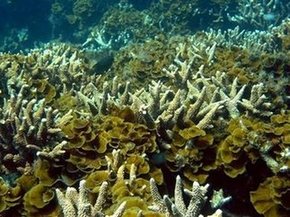|

Photo provided by the Great Barriier Reef Marine Park shows an Algal overgrowth section of the World Heritage-listed reef. A scientist said a section of Australia's Great Barrier Reef -- which scientists have warned could be killed by global warming within decades -- has regenerated itself in record time.
|
A section of Australia's Great Barrier Reef, which scientists have warned could be killed by global warming within decades, has regenerated itself in record time, a scientist said Thursday.
But Laurence McCook, head of research for the authority that preserves the World Heritage-listed reef, said the giant organism remained at serious threat of climate change and labelled the partial regeneration a "lucky escape".
The badly damaged stretch of coral at Keppel Island, at the reef's southern end, became strangled by seaweed after it began bleaching in 2006 due to elevated sea temperatures and acidity, the results of global warming.
Bleaching occurs when the plant-like organisms that make up coral die and leave behind the white limestone skeleton of the reef.
Bleached coral usually takes up to 10 years to regrow by a process of "reseeding," when larvae from a distant reef is carried by currents to repopulate the damaged area.
But in an unusual combination of circumstances, McCook said, the Keppel reef managed "asexual regrowth" from surviving tissue fragments and had returned to abundance in just 12 months.
"This is very unusual because it was a single species of seaweed and it's a species that dies back in winter," McCook told AFP.
"Then some of the coral had actually maintained enough surviving tissue that they were actually able to grow much faster than we would normally expect."
But he urged caution about the finding, describing it as an unusual and rare combination of the perfect conditions.
"If the reefs had been heavily polluted, if the area had been overfished, if tourism wasn't being well managed, all of those things could lead to the reef failing to recover," he said.
While the overall health of the Great Barrier Reef was "relatively good on a global scale," McCook said it was under very serious threat from climate change and other human impacts.
"This is a timely warning of just how serious the damage (can be) that climate change can cause. We had a lucky escape because of these unusual circumstances and that is a rare event," he said.
The reef, which is treasured as the world's largest living organism, stretches for 345,000 square kilometres (133,000 square miles) off Australia's northeast coast.
Coral growth has slowed markedly on the reef since 1990, believed to be caused by warmer seas and higher acidity.
(China Daily via Agencies April 24, 2009)